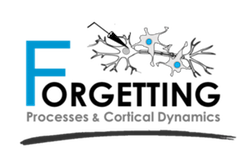 Neural plasticity of both neurons and glial cells is essential to learning and memory, and also involved in several neurological diseases.
Neural plasticity of both neurons and glial cells is essential to learning and memory, and also involved in several neurological diseases.
Our team studies these plasticity processes during both memory formation and forgetting. Indeed, while it has often been considered a deleterious process, disremembering (or forgetting) can also benefit cognitive processes, allowing us to unlearn obsolete information and prevent the emergence of disorders such as post-traumatic stress in which emotional memories must be dealt with.
Our recent work suggests that sleep could play an important role in forgetting by inducing a re-organization of synaptic and glial plasticity and of the cortical networks which subserve this process. Local inhibitory interneurons and astrocytes integrate the activity of cortical networks to modulate sleep but also memory. The diversity of interneurons also modifies their activity during the sleep-wake cycle and thus confers dynamic inhibition to the cortical networks. In pathological condition, our group showed that glial plasticity is altered. Astrocyte function, mainly through connexins at the interface between cell interactions, is highly disrupted in a model of neuro-inflammation (Devic's neuromyelitis optica). This alteration of glial plasticity leads to neural dysfunction and demyelination. Ongoing studies suggest that ependymal cells alterations could aslo be involved is this deleterious process.
3 researchers Cnrs
2 researcher Inserm
1 researchers UCBL
2 researchers professors UCBL
1 research engineer Cnrs
3 post-Doc
5 Doc
2 M2 Research
- Electrophysiology in vivo : single and multi-unit and/or intracellular recordings in freely-moving rats and mice
- Electrophysiology in vitro : intracellular recording, optogenetic stimulation
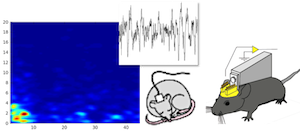
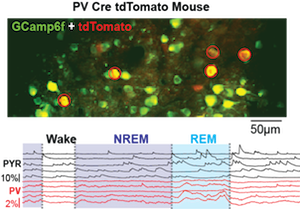
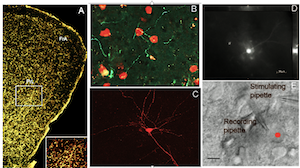
- Biphotonic microscopy in vivo, confocal microscopy. Functional neuroanatomy, transcriptomic. Cellular, biochemical and molecular approaches
- Organotypic and primary cell cultures : glial cells, myelinated neurons, ependymocyte. Flow cytometry

- Behavioral tests - memory, emotion, motor activity- in rats and mice - immunohistochemistry, standard biochemical and molecular assays

- Animal models of divers pathologies : Devic's neuromyelitis optica, Alzheimer disease
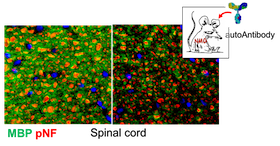
- Plasma samples collection from neurological patients
Our research project can be described in two main axes:
Axis 1. Neural plasticity, memory and neurological pathologies
Cortical Dynamics during Waking and Sleeping states, Synaptic Plasticity and Memory by Luc GENTET, Régis PARMENTIER, Gaël MALLERET, Paul SALIN, Jean-Christophe COMTE
Devic’s Neuromyelitis Optica, Alzheimer's disease and Neural Plasticity Disorder by Romain MARIGNIER, Paul SALIN
Axis 2. Neuronal plasticity of adaptive forgetting
Synaptic Depression and Forgetting by Gaël MALLERET
Sleep, Waking and Forgetting by Gaël MALLERET, Régis PARMENTIER, Jean-Christophe COMTE, Paul SALIN
RESPONSABLES
Audrey HAY et Gaël MALLERET
Audrey HAY audrey.hay@inserm.fr
Gaël MALLERET gaelmalleret@gmail.com
Valérie CUCCHIARO valerie.cucchiaro@univ-lyon1.fr











